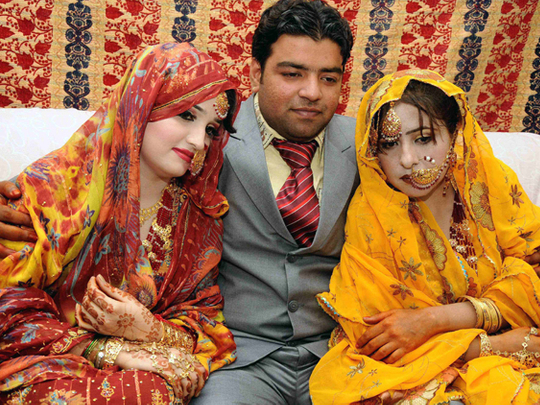
Many foreigners settling in this part of the world find the concept of polygamy as allowed in Islam intriguing. What is often overlooked is that a custom that served its people in an era long gone is not so accommodating in today's times.
This is the story of my friend Saeed who is currently facing such a dilemma; one that he himself created over a year ago. You see, Saeed is a married man... but now he has two wives!
Sometimes back in the distant past, Saeed, a wedded man with four children decided that there was some element missing from his life, some excitement if you will. After some soul searching, he came to the conclusion that the fulfilment he was yearning for would only be satisfied by the addition of another partner. He claimed he had met someone who elevated his spirits to the wild blue yonder and brought his youth back ten-fold.
Initially hesitancy and lack of courage dictated his actions as he bounced this idea back and forth among his friends. Most were encouraging although surprising enough; none within that close-knit group had been married twice.
Saeed was perhaps to be the lead man in the fulfilment of their unspoken fantasies. Their encouragement and optimism towards Saeed's stated desires was very evident then, as long as they did not have to make the first move.
At the time I remember taking him aside and cautioning him. The step he was being encouraged to take was not like buying a car or a stereo. This was a commitment for life. There was a wife and children to think about, children alive and others perhaps yet to be born.
It was indeed a serious matter that one should not decide on a whim. Even though he kept telling me that his wife quietly agreed with his decision to re-marry, I urged him not to accept it at face value. Historically, women's vanity once threatened has proven to turn into fire and scorn that can cut through stone.
Private affair
Well into middle age, Saeed chose to ignore my advice and lean towards those friends reassuring him to test the waters of matrimony all over again. The first step was to come up with a convincing sales pitch to the potential bride's parents. That was not going to be an easy a task, as his marketable skills were severely burdened by the inclusion of a wife and four children. He was determined that they were to remain an active part of his life. This was not the case of someone marrying again to break away from the present situation. After several approaches where he was rejected, Saeed was finally welcomed as an acceptable choice by the family although very grudgingly. It was through the insistence and incessant demands of the girl that her family finally gave in. The family had a social status which they felt would be severely impaired by the addition of a son-in-law who was currently a married man and a father. The one condition they insisted on that was implemented was that the marriage celebration would be a very low key and private affair.
With the passage of time, those initial euphoric days of song and dance became less and less frequent. Lightning and thunder were soon replaced by the humdrum of reality. A year into his new marriage and Saeed has now enough time to reflect on his judgment. He has had a child born by his first wife and another one from his new union within this period.
And so, how had life changed, I asked him when I ran into him recently. Well, to begin with, he is no closer to his new wife's family than before. Their acceptance of him still was no warmer than before. They remained distant and aloof, and only showed signs of excitement around their married daughter when he was not around.
His first wife, who had been resentfully agreeable to his marriage, was now full of undisguised venom. His children were resentful of their father's broken presence at home, and he was sensing a wave of desertion. His second wife, who was initially gracious in allowing him to spend more time with his first family, has begun to be increasingly demanding. The conditions in both homes once imagined by Saeed to be his castles were becoming very toxic indeed.
Saeed puts in longer hours at work, avoiding the increasing personal conflicts that have become a part of his life. He looked towards me haggard and puzzled, wondering where the dream went all wrong. ‘What happened, Tariq, and why?'
It was, and should have remained but a dream, I answered gently.
Tariq A. Al Maeena is a Saudi socio-political commentator. He lives in Jeddah, Saudi Arabia.








